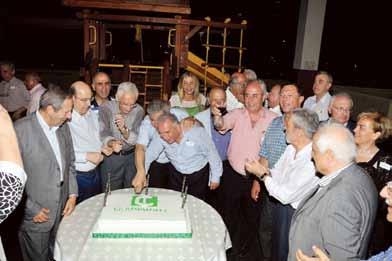
4 minute read
SAWA to make a difference
SaWa
to make a difference

Anyone who believes that one person cannot make a difference has not met Rouba Mhaissen ’06. At only 26, she is finishing her PhD, teaching at her university, running a very active NGO and speaking internationally about the plight of Syrian refugees – most recently at the World Economic Forum in Davos sharing the speaking panel with the worlds’ leaders. It all happened so suddenly. A student at SOAS, University of London, she was in Lebanon during the summer of 2011 doing the needed field research for her dissertation about women in labor markets, when she came across hundreds of refugee families sitting dejectedly in a field in the northern parts of Akkar. Back home, she found herself brooding about it. On impulse, she grabbed her phone and sent a WhatsApp message to her friends. Would they be willing to donate blankets, mattresses, clothes, food or money? Her idea was to take a few emergency relief items and distribute them to the families. The good deed done, she could return to the UK with some peace of mind. But destiny had other plans for her. Her WhatsApp message went viral. For the next few days, friends and complete strangers knocked on her door and handed over all kinds of items. Many would knock and had over envelopes. To her amazement, she opened them to find money. “It was amazing,” she recalled. “I didn’t know a lot of these people and here they were handing me cash or checks. Some were $20 and others went up to $2,000.” Altogether, she – now joined by a group of friends – managed to raise $10,000 in the first week only. No sooner had they distributed all the items, than more waves of refugees arrived. The UK had to wait. Mhaissen and her friends threw themselves in collecting donations. At the beginning it was simple. They would choose a café and send out messages for volunteers to join them. Fifteen to 20 people would show up every time. But there came a time when her home could no longer contain all the donations. Mhaissen knew it was time to establish an NGO. SAWA for Development and Aid was officially born in 2011 and in addition to
providing basic items, it concentrated on development: education, psychosocial support, youth and women are some of the project’s focus. The word went out. Many schools got involved. Some held bake sales and donated the proceeds to SAWA while others donated busloads of back packs and books. Students volunteered their time to help sort out the donated clothes. Factories donated basic supplies. One celebrity even offered to put on a Christmas performance for refugee children. Various artists also offered to spend time with the children. “This is not like a bureaucratic hierarchical NGO where one person rules,” said Mhaissen. “This is a youth initiative where everyone feels they are stakeholders and they can all do something. At any time, when needed, we have 100 volunteers who will show up.” When international aid agencies took over the Akkar camps, SAWA moved to the Bekaa and concentrated on tent clusters. First, volunteers received training in psychological social support. Then, they surveyed the refugees and noted those with specific skills. Teachers were specifically noted. SAWA then put up its own tents, as well as community centers. During the day, they are used as informal schools for children (they later managed to rent buildings). In the afternoon, the tents become a gathering area for women. Here they learn knitting, sewing, literacy courses or whatever skills offered. All too soon, SAWA stumbled on many educated refugees. “They were just like us but had lost everything in the war and didn’t know what to do here,” she said. “We call these our ‘talents’.” Among them were a group of young singers and a graphic designer who had fled Syria leaving his equipment behind. SAWA immediately raised funds so the band could record their song and invested into a laptop for the designer to continue his work. Those are only a few examples of the small projects this NGO is trying to support. SAWA depends mostly on fundraising efforts. Several Lebanese musicians, hearing of its work, donated their proceeds to SAWA’s projects. While funding from some donor institutions, donations from religious or political institutions are politely rejected. “We want to stay strictly independent,” she said. “We don’t want to be affiliated with any religious or political organization.” Still, as all NGOs can testify, funding remains a challenge. The group depends on various events such as gala dinners, targeted campaigns and personal appeals. Meanwhile, Mhaissen finds herself juggling SAWA, speeches and her PhD studies. She is currently in the UK finishing up her studies but comes back to SAWA (who has since raised enough money to hire three full time employees) at every chance. “The NGO is growing with or without me. It’s not about me. It’s bigger than me or anyone,” she said. “This is not my accomplishment on my own. Everyone is doing amazing work and giving his and her all. It’s really the least we can do with what is happening.”


For more information about SAWA, go to: http://www.sdaid.org/about-us










